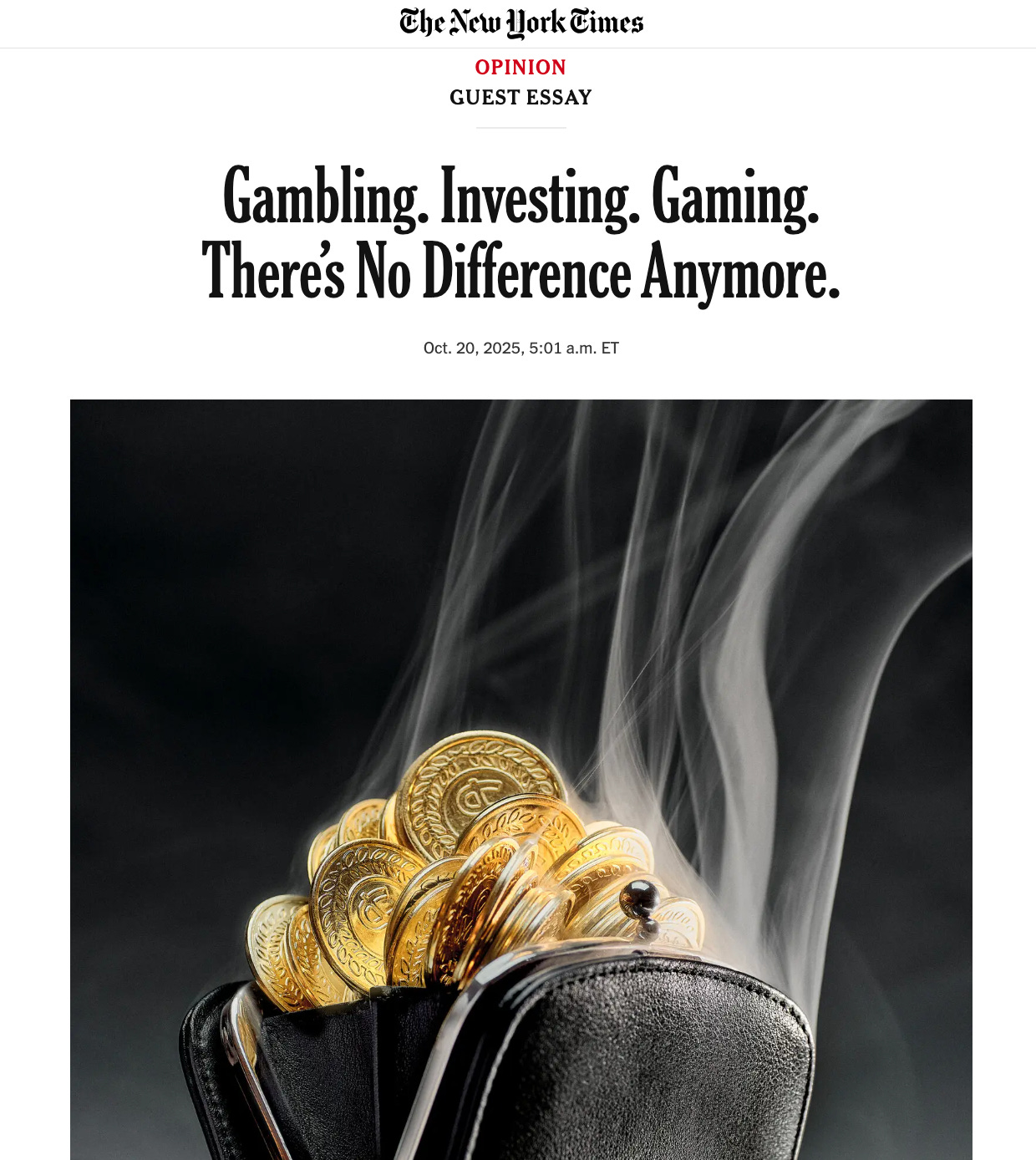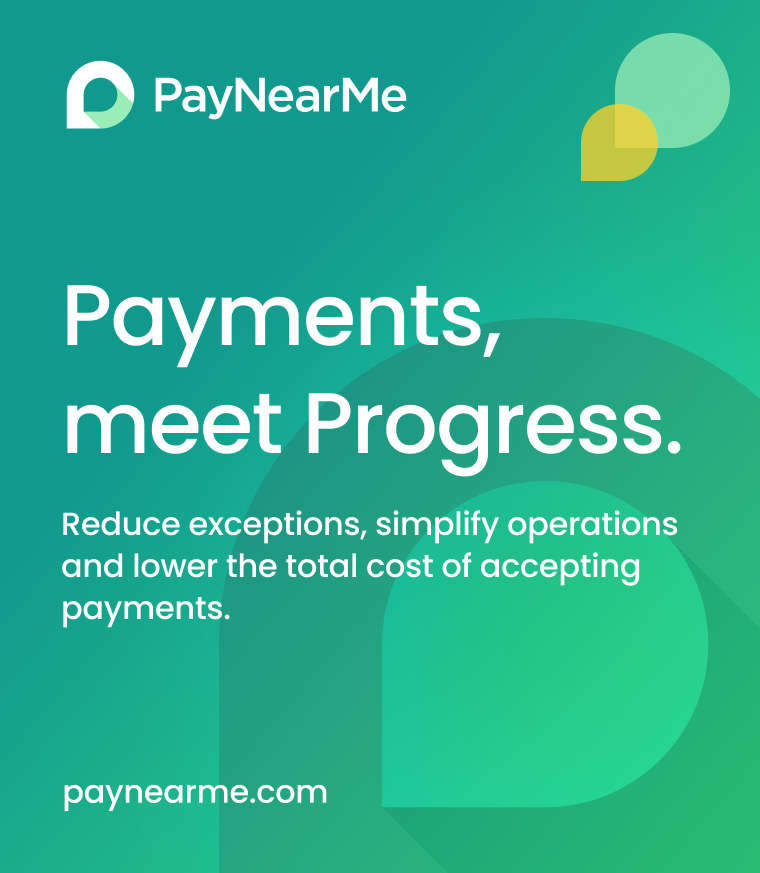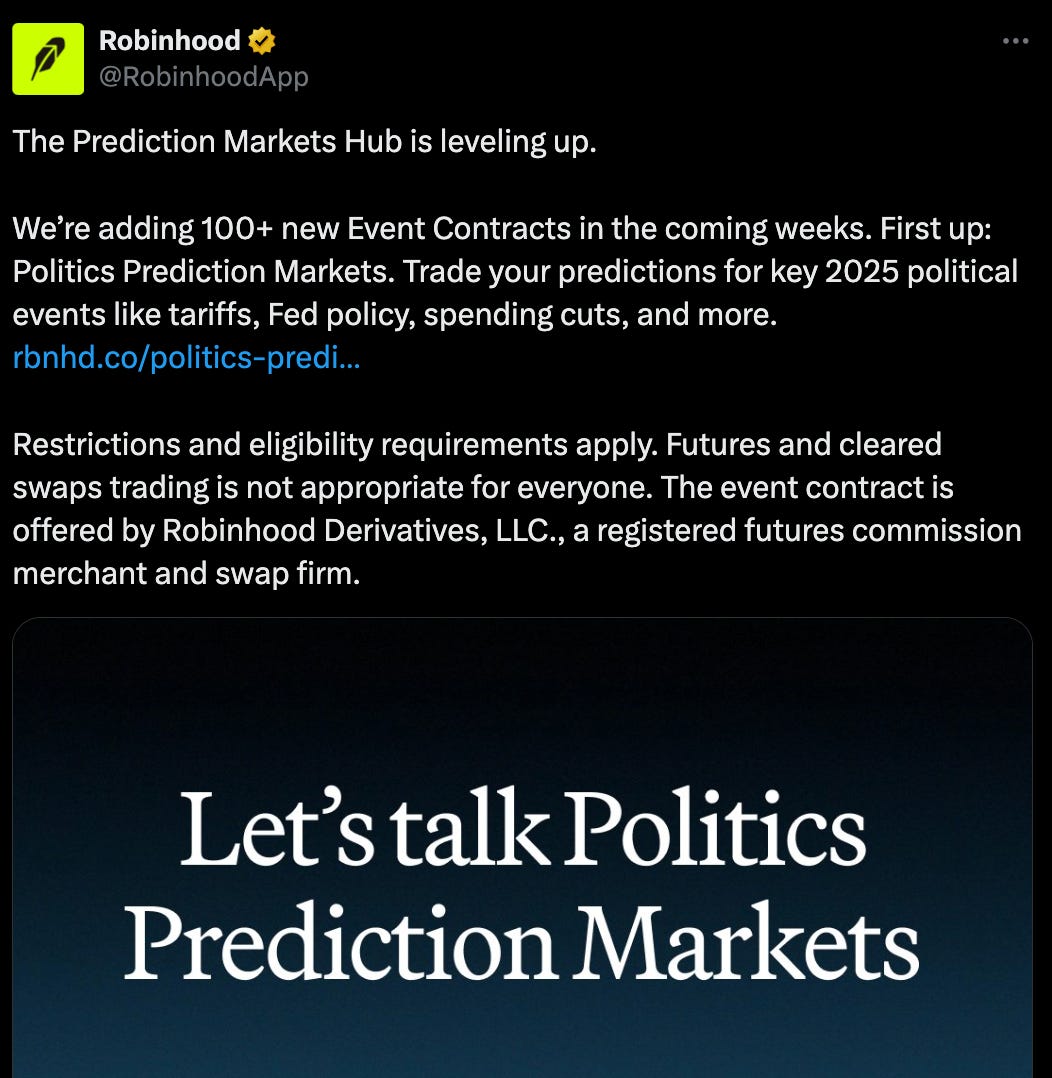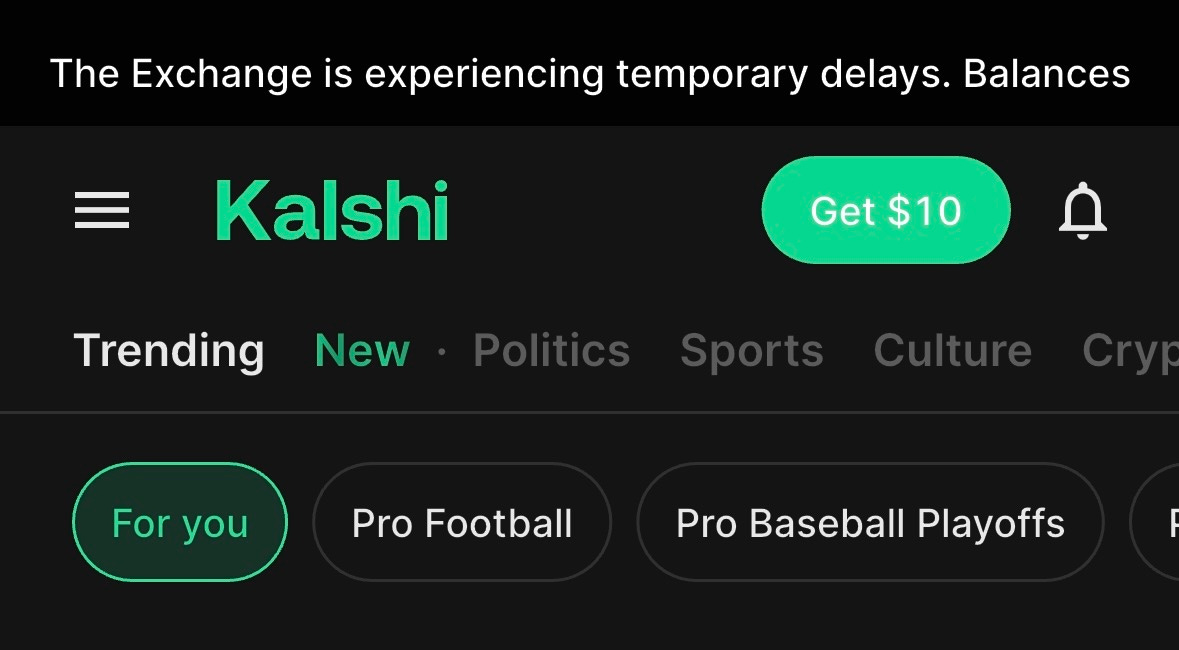NYT Op-Ed: 'Gambling. Investing. Gaming. There’s No Difference Anymore.'
Roundup: Robinhood plans to launch 100 new prediction markets; analyst notes Kalshi is mostly making in-roads in states without regulated sports betting.
Prediction markets are raising lots of money and getting bigger, which means major media outlets are starting to cover the industry more closely.
That also means publishing op-eds on the topic, including one at The New York Times on Monday headlined: “Gambling. Investing. Gaming. There’s No Difference Anymore.”
From the piece (which is unlocked above):
Now the fast-growing industry is coming for the biggest money pot out there: retirement accounts. In March, a leading prediction market, Kalshi, announced a partnership with Robinhood that allows investors to place wagers via the same app they use to manage stocks and retirement savings. The result will inevitably be financial pain. What already makes online gambling so dangerous is its lack of friction. Rather than travel to Las Vegas, withdraw cash from an A.T.M., and go to the tables, gamblers can simply pull out their phones and start betting. And now bettors can start wagering without having to transfer money from their bank accounts into gambling apps.
I could live with sports betting for prediction markets just existing, especially with a little bit of regulation treating it like a gambling product. (That seems like a pipe dream, of course.) What I continue to have a harder time with is putting a sports betting exchange everywhere you store money otherwise. Right now, that’s mostly Robinhood and Webull, but that’s likely to expand in the coming months and years.
I think people understand when they use Kalshi they’re using a sports betting app, no matter how it’s framed. Some people would argue that people generally understand Robinhood to be a betting app too, even before prediction markets launched there. But does everyone? The idea that we just have moneylines and maybe parlays next to stocks and other investment and banking functions seems like a terrible idea.
The essay was penned by Jonathan Cohen, who wrote "Losing Big: America’s Reckless Bet on Sports Gambling” and Isaac Rose-Berman, who is a fellow at the American Institute for Boys and Men and was also interviewed as a pro sports bettor in a recent CNN special report.
PayNearMe has developed the gaming industry’s first platform that is purpose-built to dramatically improve the end-to-end payment experience. It enables operators to manage the entire payment journey, for all major forms of payment and through the most popular channels. With PayNearMe, operators gain full control of the payment flow, promoting acquisition, retention and efficiency. One platform, one integration—built to solve gaming’s toughest payments problems.
More prediction markets coming to Robinhood (Twitter): “The Prediction Markets Hub is leveling up. We’re adding 100+ new Event Contracts in the coming weeks. First up: Politics Prediction Markets. Trade your predictions for key 2025 political events like tariffs, Fed policy, spending cuts, and more.”
Prediction Market Growth Falling Off? (InGame): “Kalshi’s market volume dropped for the first time during the NFL season in Week 6, Jefferies analysts shared in a note Sunday. The prediction market’s volume fell 5% for the week and 26% on the date of Sunday, Oct. 12. Additionally, according to the note, Kalshi’s “app actives” dropped 3% for NFL Week 6 and 12% Oct. 12. Jefferies’ analysts wrote that during the same time period, app actives for BetMGM, DraftKings, and FanDuel grew between 2%-3% for the week. …”
“In reviewing data about where Kalshi is making inroads, the Jefferies team pointed to California as a key growth state. ‘Since August, CA’s relative share of Kalshi traffic has grown substantially (from 13% to 17%) to become the single largest state, while the NY share has fallen (14% to 11%),’ the team wrote. Looking at the bigger picture, Kalshi’s volume continues to grow most significantly in non-legal or ‘restricted’ sports betting states.”
My take: I will note that Kalshi volume is up for the most recent Saturday over Saturday and Sunday over Sunday, from my data tracking. Still, it’s behind weekends earlier this fall at Kalshi. At this point in the lifecycle, it’s interesting to see the line isn’t going straight up. All of this comes after Kalshi launched in over 140 countries, as well.
Sports prediction markets face a new wave of fraud, from insider trading to syndicates and spoofed locations. Radar Protect helps platforms detect and stop risky activity in real time, using location and device signals across 300+ brands in finance, retail, QSR, and gaming. Flag multi-accounting, account sharing, identity theft, and more, without slowing down your user experience. Radar can help you fight fraud with less friction.
Prediction markets news roundup
Kalshi Puts Geolocation Tech Providers on Edge Amid Rapid Rise (Sportico): “Kalshi’s growth has concerned U.S. geolocation technology providers, who, like many in the gambling industry, are scrambling to figure out how federally regulated sports prediction markets might reshape their businesses.
Kalshi, unlike traditional sportsbooks, offers bets in all 50 states and has no legal mandate to sign geolocation deals for advanced customer tracking. … As Kalshi argues its broader case that federal Commodity Futures Trading Commission (CFTC) rules preempt gambling laws elsewhere, it has said in court that adopting geolocation tools to shut out customers in regions where its services are banned would cause both economic and ‘irreparable harm,’ a legal term that encompasses harm monetary damages can’t later remedy. …”
“It is not known the exact amount Kalshi would need to pay to adopt geolocation technology; the company said in a legal declaration in the Nevada case that it would be at least ‘tens of millions’ and take “many months” to set up any geolocation service. … Sporttrade chief operating officer David Huffman said the cost of geolocation was “not at all” financially crippling to his business and would still be “quite useful” if the prediction market company transitions from a state licensed entity to one under CFTC oversight.”
My take: I think it’s dawning on some folks in the ecosystem of US sports betting that prediction markets may not be great for them, both in that it could hurt their current business and that prediction markets may not need them in the same way. And that goes beyond just geolocation.
Also, a really good piece of reporting here debunking Kalshi’s claim that it would be onerous to onboard geolocation.
Nevada filed a motion to dissolve the preliminary injunction that Kalshi got earlier this year, in the wake of Nevada’s victory in a similar case against Crypto.com. (h/t attorney Daniel Wallach). Both cases are about prediction markets trying to stop any enforcement action from Nevada for offering sports betting without a license.
More from Goodwin Law attorney Andrew Kim (full thread on Twitter): “The challenge for Nevada is showing that Judge Gordon’s decision in Crypto dot com was a change in the law that warrants revisiting the law of the case. Consistency might call for dissolving the injunction, but the Crypto dot com decision is not binding authority. Nevada also could’ve made the same arguments in Kalshi re: occurrence =/= outcome or the contracts not being associated with a potential economic consequence. It didn’t, and that could factor into whether the injunction gets dissolved.”
Episode 66: Decoding Prediction Markets: Legal Battles and the Road to the Supreme Court with Andrew Kim (Straight to the Point): “In the episode, Andrew and I cut through the noise as we search for the signal in the various legal cases against Kalshi, Robinhood, and Crypto.com. Andrew offers up a 20-minute summary of all the cases (which is the best 20 minutes you’ll spend trying to untangle this Gordian knot).
Is sports betting becoming a regulated security, too?: Here’s a press release from InPlay Global (h/t to Wallach again for spotting this). Emphasis is mine.
InPlay Global, Inc., a regulated financial market operator developing the world’s first marketplace for Performance Securities™, today announced the appointment of Troy Kane as President and Chief Operating Officer of the newly established sports performance equity marketplace, creating the world’s first regulated securities tied to the real-time performance of college and professional sports teams. In this new role, Kane will oversee market operations, regulatory strategy, and technology infrastructure as the company advances toward anticipated commercialization, pending U.S. Securities and Exchange Commission (SEC) qualification and Financial Industry Regulatory Authority (FINRA) approval of InPlay Markets, the company’s Alternative Trading System (ATS). … The platform is being engineered to function within the U.S. regulatory framework for securities trading, connecting through participating broker-dealers and operating on a central limit order book (CLOB) to ensure transparent price discovery and unified liquidity across the market. ….
Performance Securities are regulated financial instruments that provide economic exposure to the measurable performance of college and professional sports teams. These securities are independently created using publicly available performance data and are not affiliated with, sponsored by, or endorsed by any sports team, league, conference, or governing body. Reflecting real-time team performance over defined competition periods, prices move based on two measurable drivers: (1) on-field performance and (2) marketplace participation. These securities do not represent ownership in a team and are distinct from betting, gaming, fantasy, or prediction markets, which rely on odds or binary outcomes rather than market-based price formation.
Vince Gennaro, Executive Director of the NYU Lab for Transformative Leadership, School of Professional Studies, said, “In a transformative move, InPlay Global’s birth of a new US regulated asset class is innovative and game changing. Instead of short-term binary outcomes and prop bets, investors and fans can trade a stake in a sports teams’ performance over the duration of a season. These new financial markets equities will democratize investment in sports teams’ performance.”
Polymarket Airdrop Farmers Have Become ‘More Sophisticated’ as Token Launch Looms (Decrypt): “Users attempting to farm a potential Polymarket airdrop have upped their operations in an attempt to make it harder for the prediction market to exclude them. It follows recent Decrypt reporting that Polymarket plans to release a crypto token once it has regained a foothold in the United States—likely in 2026. Last year, as many users anticipated that a token launch would follow the U.S. election, farmers bought and sold large positions to artificially inflate their volume. They did so in an effort to position themselves for a larger allocation of a future token airdrop, which are often designed to reward a crypto protocol’s most active and fervent users. This method was extremely easy to spot and annoying for normal users, as it clogged the activity feed—so much so that pseudonymous Polymarket whale Fhantom Bets said he’d personally report them. Now, both Fhantom Bets and notable Polymarket user CSP Trading told Decrypt they believe farmers may have gotten ‘more sophisticated’ in their efforts, as that previous pattern has mostly disappeared.”
Apps like Robinhood, Kalshi worry California gaming tribes more than online fantasy sports (KCRA): “While the feud between California’s gaming tribes and online fantasy sports operators has received a lot of attention over the past few months, the leader of the association that represents the gaming tribes signaled the group is far more concerned about another set of online platforms. In an interview with California Politics 360, the chairman of the California Nations Indian Gaming Association, James Siva, said the biggest issue facing the gaming tribes is the rapidly growing popularity of prediction market apps.”
“The emergence of prediction markets and these sports event contracts being offered by companies such as Kalshi, Crypto.com, Robinhood. Those offerings have much, have much more concerns for tribes, at the moment,” Siva said when responding to a question about his concern with daily fantasy sports apps.”
Meet Polymarket’s $400 Million Man (Everybody’s Business podcast): “This week we hear from Domer - a longtime prediction markets junky who has placed more than $400 million worth of bets using Polymarket. At any point he might have 1,000 or more bets on prediction market sites, ranging from wagers of a few thousand dollars to as much as $1 million, roughly the sum he put on Taylor Swift’s new album sales.”
ICYMI, Kalshi had some problems on Saturday.
Kalshi Down For Some Users On Saturday: What We Know
·Kalshi had some technical issues during a busy college football Saturday, causing some users to have their trades filled while they were unable to access the platform to cancel them.
Despite that, Kalshi trading volume was still up over the previous Saturday.
Insider Trading in Prediction Markets: Feature or Bug? (Prediction News): “Last week, the Nobel Peace Prize leaked on Polymarket nearly 12 hours before the scheduled reveal. Onlookers quickly jumped to the conclusion that someone with closed-door access traded on material non-public information (MNPI) and made out like a bandit. Never mind that the insider theory may not hold up, as another explanation has emerged: traders found the clue on an XML sitemap rather than through a private tip. Either way, the debate about prediction markets and insider trading ensued across social media. ‘It’s a feature.’ ‘No, it’s a bug.’ The truth? Likely somewhere in between.”
My take: The piece goes on to suggest ways that “platforms can reduce headaches and protect users.” Spoiler alert: They aren’t going to do any of those things.
There are undoubtedly places where insider trading helps us get to interesting data, and I would agree that whether it’s a feature or a bug is debatable. But in some markets, that data only gets us the news faster (like who wins an award or what happened on a reality show). Is that useful? Not in any kind of material way.








The NYT piece raises some good points about how the lines have blured but I think Robinhood launching 100 new prediction markets is actualy a smart move for them. The platform already attracts people who are comfortble with risk so adding more prediction markets fits their user base naturally. What's iteresting to me is how these prediction markets might bring in a different type of user compared to their traditional brokerage customers. Are they targeting political junkies or expanding beyond elections into sports and entertanment? I wonder if this helps them compete better against Kalshi or if they're going after a completely different segment.
Completely agree.
These lines blurred so long ago that anyone under 24; hasnt a clue when you say “games never used to NOT HAVE micro-transactions”